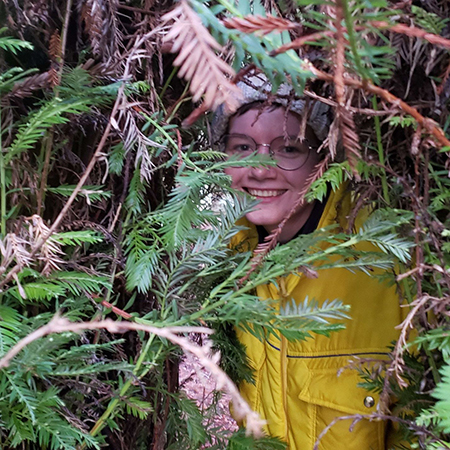When Maer’s wife died, she left behind a single seed. She didn’t know it was a seed at first, that strange little thing—a tight green, cone shaped pod that later split into snowy white tufts. Willow seeds, the internet declared. The internet also demanded she sweep away their soft downy feathers, strip them to their tiny, embryonic cores. She kept one. A wind scattered the rest.
“Helice, my darling,” she’d say, watering the dark cup of soil with her tears. “My darling.”
The soil sprouted, and the seedling became Maer’s only respite from hospital bills and funeral arrangements. She opened the window blinds so Helice could see the sun. Day by day, the shadow cast by the seedling grew longer and longer. When she measured six inches, Maer transplanted her to a 1-gallon container.
Maer carried her love in her arms, taking Helice out into the garden for the first time. Her garden. A stone path cut through raised beds of lavender and zucchini and asparagus. The expert, minimalist design of its creator had turned gross with floral overflow, vegetation exploding across the yard.
“I dropped the ball, I guess,” Maer whispered, pushing the pot into the half-shade. The dark filled her eyes. She studied the thin, tender green sapling for any kind of reaction. “Does it disgust you, Helice?”
The care of the sapling was the only absolute in Maer’s grieving, but the more time she spent in the garden, the more the yard violated her with its spoiling, its overripe waste of life. Hugely gleaming butternut squash caught on her toes, tripping her as she walked. The birds pecked holes in the soft orange skins of her apricots. Maer watched the juice drip from its curves and wondered what gave this place the right to continue its bleeding, to continue its twisting and its thirsting and its sun-soaking. Its creator was dead. Her heart didn’t work anymore. By all logic, her remains should have been left bloodless, too.
But it felt worse to watch all the little bodies just rot.
Maer cut bunches of lavender, tied them in twine, and hung them to dry in the window above the kitchen sink. She went from going days without feeding herself, to eating like an animal with her knees in the dirt. Maer bit into cucumbers, stuffed romaine lettuce into her mouth, snatched slightly unripe apricots before the birds could get to them. The salads came next. She chopped up whatever she could find and stabbed her fork into big great bowls of greenery. No time for groceries. No time for going out. Maer sat and ate and cried until the willow’s size demanded it be moved to a more permanent location.
She hired contractors to uproot the fence and make room along the edge of the garden’s little pond. The ideal time to plant it outside is in early spring, after the danger of frost has passed, said the internet. Get back to work, it added, in the form of a politely worded email from HR. Her grief money paid the mortgage on the house that she and Helice had bought together, paid for the burlap sheet and wooden frame and stakes she needed to cover the sapling when the weather turned cold. Maer followed Helice’s old recipes and roasted butternut squash before peeling the hard skin off and boiling it into soup. When she wasn’t toiling at the computer, she bundled up and sat on the edge of the icy pond and sipped the stew through numb lips.
“Doesn’t taste the same,” she admitted to the air.
The warm breath of spring came and blew life back into the garden, back into Maer’s dragging routine. No longer even attempting to follow Helice’s orderly patterns, Maer wantonly planted fresh lavender, fresh zucchini, fresh asparagus. She tied long strips of flash tape to the branches of the apricot tree, smirking at the birds all the while. Gone was the winter of takeout food and grocery rotisserie chicken; Maer julienned carrots for stir fry and simmered tomatoes into pasta sauce. She saw ghosts of her wife with every mistake she made—Helice could have reminded her to salt water before boiling pasta, could have bandaged Maer’s fingers when they split on the edge of the knife.
God, the ghosts. Maer longed to be touched by the dead, to be cradled in cold hands. She’d planted enough to know that there was nothing to fear in the earth. They could be bedded together in the soft and in the dark. Rot into the grit.
A wind shook the glass of the thin kitchen window. Out the window, there were branches. The thin woody shoots spread out from the bough, spilling through air, palming the light. Look at me, the willow seemed to say. Look at what I can catch now.
The shape of it, framed above the sink. Finger-trembling. Lung-gripping.
Maer followed that green rippling silhouette out into the garden, backdoor clattering behind her. The young willow had grown an exorbitant amount over the course of the year; it stretched taller than its caregiver, standing at nearly six feet of radiant, draping curtains.
Maer stood under its boughs for the first time, and the willow was everything. The roof. The walls. Fistfuls of caught sun spilled over her cheeks, her shoulders, her cut hands. A wind pushed through the leaves. Sensations of warm and cold swam over her skin. With her eyes closed, it was all shifting patterns and uncertain figures. It was all just a woman and a willow and no ghosts, no ghosts in the air.

Myra Scott is a neurodivergent queer writer based in the foothills of the Sierra Nevada. She received her BA in English Studies at California State University, Chico, where she shares an apartment with three lovely roommates. When it rains, they like to circle up and do crafts together.